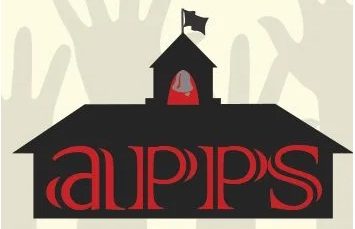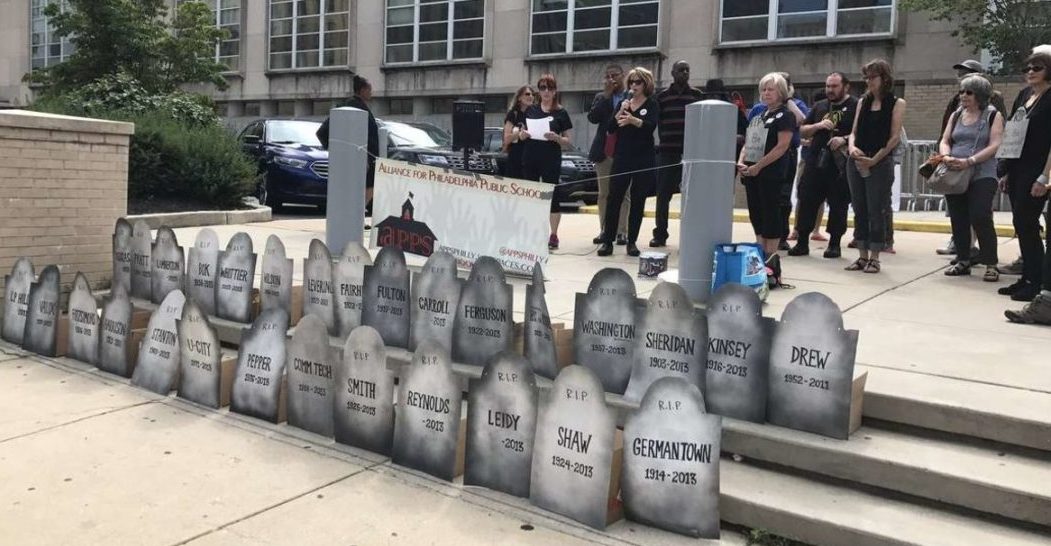
By Alison McDowell
November 23, 2015
Alison McDowell is a Philadelphia public school parent and a member of the Alliance for Philadelphia Public Schools. This article is an expansion of her testimony to the Philadelphia School Reform Commission on November 19, 2015. While it speaks to developments in Philadelphia, the discussion of “community schools” has national implications.
If you read my SRC testimony it paints a troubling picture. Given that my testimony was limited to three minutes, I wanted to add some additional thoughts to the conversation. It’s particularly important to get these ideas out there, because Philadelphia’s mayor elect Jim Kenney and his new Chief Education Officer, Otis Hackney, just took a trip to Cincinnati with the express purpose of learning more about the community school model and how it could work in our city. While Oyler, the school they visited, is lauded for its program, the long term success of the model remains uncertain.
As I see it, two groups are working concurrently on community school initiatives. They hold opposing views about what community schools are. Corporate education reformers talk about eliminating the concept of “seat time,” instead they want to promote the idea that you can learn anywhere at any pace. I see that line of thinking as potentially very dangerous if you’re someone like me who values real bricks and mortar schools as a cornerstone of civil society. At the same time there are an increasing number of people who are involved with community school initiatives on the local level. They see community schools as neighborhood anchors. The problem is that they have absolutely no knowledge that there is another powerful group, the corporate education reformers, including Tom Vander Ark, working to undermine all they are doing.
Meanwhile, the corporate education reformers have set up the legislation so that once a network of non-profit and technological partnerships are in place, human teachers will no longer be necessary for their 21st century version of education. The federal government and partners like Citizen Schools move things along by putting resources behind this “transformation.” It won’t happen immediately. The timeline is probably 10-20 years. So the corporate education reformers can just sit back and wait for the first group, people like us, to do the work of acclimatizing the public to the concept that community=school and school=community. Which will be fine, until one day the neighborhood schools close their doors in favor of an online and outsourced community model and we’ve reached the end game.
I think it’s pretty clear that as a society, we simply don’t have the will to fund schools appropriately. Forty-three school districts in Arizona are now having children go to school only four days a week as a cost-saving measure. On Fridays, some students go to the local Boys and Girls Clubs for a “learning day.” So it looks like we are in the process of outsourcing public education already. When I first learned of this, I thought it would be more in the 5-10 year time horizon. I find it shocking that it’s already happening.
We thought with Pennsylvania Governor Wolf the funding situation would change. I’m still not sure how things will play out. If new funding comes in, and we don’t see librarians, five-day school nursing, counselors, and literacy aides come back to every school quickly, then we’ll know. If the Philadelphia School District instead directs that money to blended learning, we’ll know that they are taking our schools in a completely new direction. Even the article on setting up donated classroom libraries last week-what a farce. Donated bins of books ARE NOT THE SAME AS HAVING A CERTIFIED LIBRARIAN IN A SCHOOL! And it is part of the campaign to normalize a situation that should not be normal, and Kenney is just going along because he really doesn’t know better, and no one is telling him.
If you’ve ever sat through a Philadelphia School Reform meeting, you know that they are not going to give Philadelphia parents a “community school” in the sense of true community participation. We are on our third Broad Academy superintendent, and community engagement generally only qualifies as “theater.” Those community partners won’t supplement, they will replace, school staff. Will anyone demand that all schools be returned to pre-cut-back staffing levels before community partnership MOUs are issued? And where is the money going to come from to bring in those services? If they use social impact bonds, the accountability metrics will skyrocket because those partners will be accountable to the venture capitalists and if the rate of return varies based on success metrics, you can imagine there will need to be lots and lots of data gathered.
Even if non-profits underwrite the cost, there will still need to be data gathered to justify grants. There could be the move to medicalize situations where students really just needed a bit of down time and an adult to talk to, because the person will need to tie that to a billable code. What safeguards are in place around that health and mental health information being collected on students by partners probably in many cases without the knowledge of the parents? Outsourcing school functions means having children end up with data driven education and data-driven lives.
It’s also clear that the push is towards workforce development. Labor wants data they can use for their projections. They have the academic data, but they need the other stuff to make it work. They need that non-cognitive behavioral piece, because we all recognize that it’s important. How are they going to get that data? Do you think parents are comfortable with the idea that partners may be monitoring Johnny’s “grit” level? Maybe they’ll want to know does Sally show proficiency in teamwork? creative problem solving? conformity? ETS is setting up measures right now. Locally, at the University of Pennsylvania, we have Duckworth’s “Character Lab” and Seligmann’s initiatives for “Authentic Happiness.” Out of School Time Partners across the country are collecting aggregated student data now. I don’t know that it includes non-cognitive proficiencies, but that could be easily added.
The other piece you need to be aware of is ELOs, also know as Extended or Expanded Learning Opportunities. The folks behind ELOs include the National Governor’s Association and the Chief Council of State School Officers who brought us Common Core State Standards. In their view, education can just be broken down into bits, and in the future kids will collect them like digital badges through demonstrations of mastery that will eventually be done primarily online. Of course most parents are not digital natives and would chafe against this vision of education as essentially cyber school. So instead, certain competencies (also I think this is where the non-cognitive ones come in) are developed with partners through “real world” “community-based” problem solving. The sales pitch will be for THIS part of the blended learning model. They will sell parents on all these great projects combined with the most innovative technology, but what most students will get is a bunch of Rocketship Academies with vans that take kids to the local hospital for an internship (and maybe the hospital gets some volunteer labor). Maybe I’m jaded, but in my heart I feel that the innovative schools they have been set up in Philadelphia cannot be scaled to serve a majority of students. I believe they are part of a bait and switch plan.
The SRC just adopted a $22.5 million contract with Infinite Campus for a new student information system. This system will enable “student-centered” education and support “innovative” school models. Many large districts across the country are doing the same thing right now. I’m pretty sure that will the infrastructure needed to support the new competency-based education model with room for ELOs and student-directed learning. In fact, if parents check School Net there is a tab for Individual Learning Plan, that seemed to be total BS, but it is in fact a precursor to CBE.
This transformation has been in the works for 15 years. In many ways, I fear the issue of high stakes testing was perhaps a straw man so they could make their profit on the tests, knowing that the plan was always to walk away from them and move into stealth testing. For all the talking points we have, CBE offers an answer. Hate having a kid’s evaluation riding on one test? OK, we’ll gather their data all the time through stealth testing. Hate standardization? We’ll offer you “personalization.” Have we driven out thousands of experienced teachers through our emphasis on testing, test prep, and data-driven instruction? Oh, we can fix that. We’ll just raise class sizes using a blended learning model where the kids are online most of the time and out in the community the rest of the time. We really don’t need so many teachers, and the ones we want around are the ones who can tolerate spending their days in front of data dashboards.
It was all so very clever, and it will be hard to tell folks the emperor has no clothes. People want to believe the community schools concept is a good one. They want that. Who wants to be against a cool community project? Right? No one wants to be the one saying, hey the logical conclusion if you put no limits on how many credits can be earned online (see Gates-funded Great Schools Partnership) and in the community leads to the eventual outcome that schools disappear entirely.
Before we move full steam ahead with Community Schools, could we take some time to seriously discuss full, fair funding of public education? We need real funding, sustainable funding, enough funding so that our schools can be safe and functional, and even joyous. If we have that, we would have staff to help families navigate community services that already exist in their neighborhoods. Hey, what an idea! But that would require reinstating jobs that come with benefits and pensions, jobs that strengthen labor’s position. My guess is that neoliberal interests are simply not going to let that happen.
I leave you with one observation. In all of these plans for “community schools” are the partners who will be providing the services and ELOs going to be big “C” community members or little “c” community members? I expect a majority will be the former, because they have the infrastructure to access the funding. Many of these initiatives seem to be linked to major players like the United Way and local universities and outposts of national non-profits and city agencies. I mean it’s not like your neighbors are actually going to be running the programs. If that is the case, why not just put the money directly back into the schools, so they can build the community there?
Also see:
City leaders picture full-service schools
Philadelphia Inquirer – November 23, 2015
Newark’s Baraka to launch “community schools” in South Ward–with Cerf’s blessing
Bob Braun’s Ledger – November 23, 2015
Pearson GERM in the Philippines Is a Scare Story for the Rest of the World
Alan Singer @ Huffington Post – November 22, 2015
Corporatized Education in the Philippines: Pearson, Ayala Corporation and the Emergence of Affordable Private Education Centers (APEC)
A research paper released November 22, 2015 which is a study of corporatized education deform in the Philippines thanks to Pearson. It targets low-income students to prepare them for low-paid, low-skilled jobs with foreign companies.
Private, Subsidized Schools in Chile
International Education – November 5, 2014

